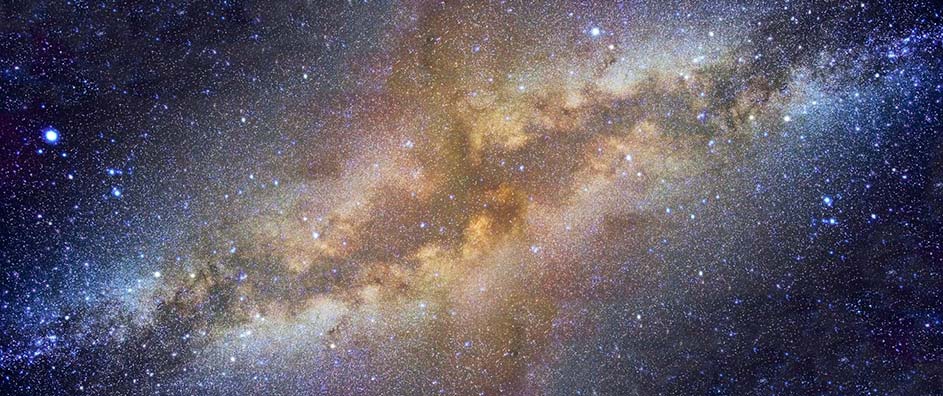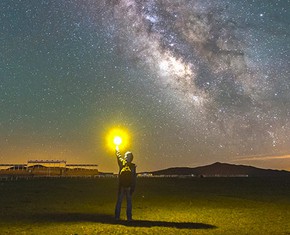The views expressed in our content reflect individual perspectives and do not represent the authoritative views of the Baha'i Faith.
When we gaze out into the Milky Way at night, what does it show us?
In the newly revised and re-translated Baha’i book Some Answered Questions, Abdu’l-Baha begins by describing nature and its adherence to universal laws, such as gravity, which maintains the planets and their moons in orbit around our life-giving sun for billions of years. Our solar system’s sun and its rules govern our lives on this material plane of existence. The principal component of the solar system, our G2 main-sequence star contains 99.86% of the system’s known mass and dominates it gravitationally. For a moment, consider that amazing organizational feat—keeping these immense bodies in place or in orbit, hanging in space in a small galaxy amid billions of galaxies, providing order for billions of years:
This nature is subject to a sound organization, to inviolable laws, to a perfect order, and to a consummate design, from which it never departs. To such an extent is this true that were you to gaze with the eye of insight and discernment, you would observe that all things—from the smallest invisible atom to the largest globes in the world of existence, such as the sun or the other great stars and luminous bodies—are most perfectly organized, be it with regard to their order, their composition, their outward form, or their motion, and they are all subject to one universal law from which they never depart. – Abdu’l-Baha, Some Answered Questions, newly revised edition, p. 3.
Abdu’l-Baha then goes on to say:
It is certain that the entire contingent world is subject to an order and a law which it can never disobey. Even man is forced to submit to death, sleep and other conditions—that is, in certain matters he is compelled, and this very compulsion implies the existence of One Who is All-Compelling. So long as the contingent world is characterized by dependency, and so long as this dependency is one of its essential requirements, there must be One Who in His own Essence is independent of all things. – Ibid., p. 6.
This beautiful, intellectually cohesive proof of the existence of God demonstrates nature’s and humanity’s reliance on a Creator. When we look up into the skies, the universe shows us a perfect order and symmetry—which reveals the mind of the Artist who made it:
Among the proofs and arguments for the existence of God is the fact that man has not created himself, but rather that his creator and fashioner is another than he. And it is certain and indisputable that the creator of man is not like man himself, because a powerless being cannot create another being, and an active creator must possess all perfections to produce his handiwork.
Is it possible for the handiwork to be perfect and the craftsman imperfect? Is it possible for a painting to be a masterpiece and the painter to be deficient in his craft, notwithstanding that he is its creator? No: The painting cannot be like the painter, for otherwise it would have painted itself. And no matter how perfect the painting may be, in comparison with the painter it is utterly deficient. – Ibid., p. 5.
Next, Abdu’l-Baha logically compares the two poles of existence. He cites a range of opposites, such as poverty to wealth, wisdom to ignorance, or goodness to evil. Then he asks: For how would we know light without the Sun? How would we know darkness without the absence of that light?
Having clearly shown how universal laws govern all existence, created and enforced by the Supreme Being, Abdu’l-Baha outlines the process of divine education, and challenges us to acquire the attributes and perfections of God:
Human education, however, consists in civilization and progress, that is, sound governance, social order, human welfare, commerce and industry, arts and sciences, momentous discoveries, and great undertakings, which are the central features distinguishing man from the animal.
As to divine education, it is the education of the Kingdom and consists in acquiring divine perfections. This is indeed true education, for by its virtue man becomes the focal centre of divine blessings and the embodiment of the verse “Let Us make man in Our image, after Our likeness.” This is the ultimate goal of the world of humanity. – Ibid., p. 9.
The Baha’i teachings ask us all to aspire to the highest goal of humanity: to know and love our Creator. How can we do that? How can we acquire a divine education?
We’ll look at that question in the next essay in this series.
















Comments
Sign in or create an account
Continue with Googleor